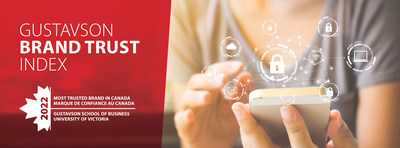VICTORIA, BC, April 30, 2022 /CNW/ –
For more media materials, please visit: https://www.multivu.com/players/English/9043551-2022-gustavson-brand-trust-index/
The 2022 Gustavson Brand Trust Index (GBTI) reveals that Canadian consumers are more distrusting of dominant technology brands than ever before, even while their use of these companies’ services is on the rise.
Now in its eighth year, GBTI shows a steady decline in trust in some industries such as social media and technology, a downward trend that has increased since the start of the pandemic.
“This presents an urgent challenge as well as a critical opportunity for brands to engage more effectively with their consumers,” said Saul Klein, dean of UVic’s Gustavson School of Business. “Our research reinforces the notion that Canadians have an acute awareness of whether a brand is truly responsive to the needs of both their consumers and employees. Canadians are willing to vote with their wallets if they feel that a brand’s values no longer align with their own.”
Large, global technology brands, such as Amazon, Google, Microsoft and Apple, have seen a steep decline in trust that other regional and national brands have not experienced to the same degree.
“These global brands have the advantage of ubiquity, and it’s hard for consumers to choose not to use them,” says Klein. “But their enormous size can also be a disadvantage, as the growing amount of power concentrated in these brands can generate distrust among some consumers.”
The personalities associated with tech giants, as reflected by their founders or leaders, may also play a role in how Canadians view and trust these brands.
“Having an outspoken and controversial CEO, as do Amazon, Tesla and Uber, certainly brings attention to a brand, but that can also have a negative effect on brand trust,” said Klein. “Similarly, how those brands respond to events has an impact. As the crisis in Ukraine unfolded, for example, consumers took a keen interest in which companies joined the corporate boycotting of Russia.”
Consistent with the distrust in dominant technology companies, trust in social media brands (Facebook/Meta, Instagram, Snapchat, TikTok, Twitter, WeChat and WhatsApp) is at an all-time low. Trust in traditional media also dipped in 2022, but remained significantly higher than social media channels, with the Weather Network being the 14th most trusted brand in Canada overall.
Not surprisingly, GBTI highlights that 21st-century consumers care not only about the products and services companies provide, but also how those companies treat their workers. While Costco, MEC (Mountain Equipment Company) and Canada Post ranked as the best performers for employee treatment, online retail giant Amazon and ‘gig economy’ businesses such as Uber suffered in this area.
“Work and work-life balance has been a major topic of conversation and coverage in news cycles recently,” said Klein. “Our results show that consumers have been taking a critical look at how companies look after their employees. Grocers such as Costco which implemented pandemic pay, saw much higher rankings than companies that failed to provide stable incomes.”
Other Key Findings
- Grocery stores are the most trusted category in 2022. Consumers ranked the grocery store category high as the industry responded to consumer sensitivities quickly in implementing health and safety measures during the pandemic.
- Across generations, people distrust the same brands. The most trusted brands, however, vary by age, gender and region. Except for Canadian Automobile Association, no other brand made it to the top-performing list across all three age groups.
- Consumers appear to be taking greenwashing seriously. When Canada’s Competition Bureau took action against Keurig Canada over the misleading claim that Keurig coffee pods are recyclable, trust scores fell.
- Packaged food brands experience eroding trust.. After surge in demand the previous year, this possibly comes as a result of home seclusion and pantry loading.
Brand Trust Index Webinar
Join us for a discussion about the Gustavson Brand Trust Index and what brand trust looks like for businesses in 2022 and beyond. Guests include Klein; Sam Sebastian, president and CEO of Pelmorex; Laura Baker, chief marketing officer at Home Hardware, and Jeff Walker, chief strategy officer, Canadian Automobile Association.
This free webinar will take place on:
May 3, from 10 a.m. to 11:30 a.m. PDT
To register, please send an email to [email protected]
For more information and infographics, please see the media kit.
About the University of Victoria
UVic is one of Canada’s leading research-intensive universities, offering life-changing, hands-on learning experiences to more than 21,000 students on the edge of the spectacular BC coast. As a hub of transformational research, UVic faculty, staff and students make a critical difference on issues that matter to people, places and the planet. UVic consistently publishes a higher proportion of research based on international collaborations than any other university in North America, and our community and organizational partnerships play a key role in generating vital impact, from scientific and business breakthroughs to achievements in culture and creativity. Find out more at uvic.ca. Territory acknowledgement
Follow us on Twitter: @uvicnews
UVic media relations & services: www.uvic.ca/communicationsmarketing/media
SOURCE Gustavson School of Business




